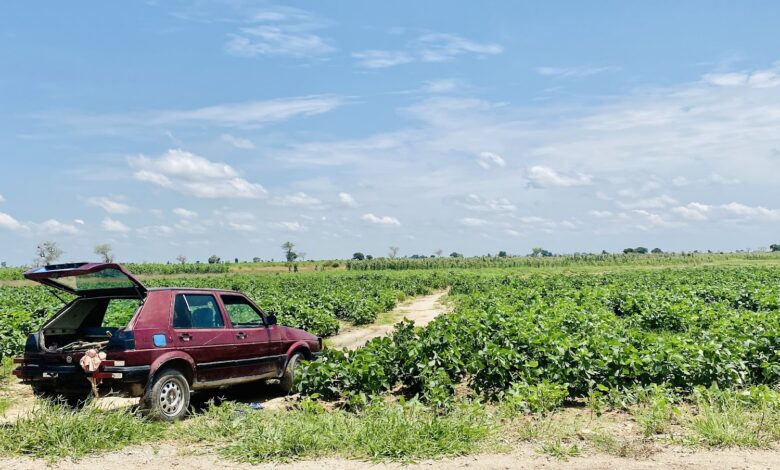Locals Forced Into Unusual Tasks To Meet Boko Haram Taxations In Northeastern Nigeria
In Nigeria's Borno state, locals in remote hinterlands pay taxes to Boko Haram terrorists through errands and logistics supplies in exchange for their survival.

“I had to choose between farming or not,” said Abba Gana, a farmer from Konduga, Borno State, in North East Nigeria.
Gana was recounting the day he was cornered by ten armed Boko Haram members who demanded he run errands for them or risk death. This unusual demand is part of a grim reality shared by local farmers, fishermen, and residents in Konduga, a local government area in Borno state, where survival means bending to Boko Haram’s whims.
In this precarious arrangement, locals are compelled to provide or help procure consumable items such as sugar, salt, and Maggi seasoning to the terrorist group, effectively paying a tax in kind, Gana revealed in a recent interview with HumAngle. In return, they are allowed to continue their farming and fishing activities.
Yahaya Kifima, a fisherman from Kawuri, a village in Konduga local government area, reinforces Gana’s viewpoint.
After losing his fishing privileges due to the insurgency, Kifima succumbed to Boko Haram’s pressure by taking on errands despite the financial burden and risks associated with it.
However, rumours of his involvement with Boko Haram led to tragic consequences for his family. His son who he was travelling with was shot dead at a checkpoint by soldiers as he was trying to flee after he was suspected of being a terrorist’s accomplice. Kifima himself was brutally beaten and transferred to Bama prison, then to Giwa Barracks in Maiduguri.
Kifima’s story is not unique; many farmers have been arrested and detained without trial – with others losing their lives – for their involvement as logistics suppliers for Boko Haram whether willingly or in exchange for survival.
Abba Gana, a local farmer in Borno state emphasized the benefits communities derive as a contrast between villagers from Kawuri and those from Konduga. The former generally resist Boko Haram, while the latter are more likely to comply, he said.
He told of a recent incident where 11 farmers were kidnapped and killed despite ransom attempts; they were from Kauri, a village less inclined to run errands for Boko Haram.
In this desperate situation, many locals accept Boko Haram’s demands as a way to survive.
“Any community that manages to farm without incurring Boko Haram’s wrath had achieved that feat because they negotiated their safety with the terrorists,” he said.
“They must have fulfilled the insurgents’ condition which includes running errands and offering a portion of their farm output as tax. Some communities have realized that coexistence with Boko Haram out of mutual benefit is the only way forward.”
While Gana was able to secure his safety and that of his farm by paying tax in the form of errands for Boko Haram in 2021, he expressed concern for his less fortunate colleagues. Many were intercepted by the military while trying to traffic food items for the insurgents and were imprisoned indefinitely as Boko Haram accomplices.
Abba Gana says he had been forced to procure a diverse range of items for them, including marijuana, cigarettes, paracetamol, Flagyl, cassava flakes (garri), salt, and almost all vital daily necessities for their survival. During the course of this forced coexistence, however, something perhaps more harmful is occurring: Locals are increasingly becoming less opposed to the activities of the group.
“I am worried about this unending conflict, where death and starvation persist. I don’t mind coexisting with Boko Haram, as long as they guarantee my safety while conducting my business,” one resident told us.
In May 2023, the Nigerian military announced the arrest of 25 suspected Boko Haram logistics suppliers in parts of Borno state.
In a media report, the Director of Defence media operations at the Defence Headquarters, Major General Musa Danmadami, said that “between May 4 to 12, 2023, troops arrested 25 Boko Haram /Islamic State of West Africa Province terrorists logistics suppliers at different locations within the theatre of operations and recovered 75 bags of fertilizers, 7 vehicles, 2 drums of Premium Motor Spirit, 6 gallons of engine oil, 7 drums of water, 3 bags of grains, 3 bags of salt, 1 carton of Maggi seasoning, 12 hose cables, 8 new tires, 1 carton of bulbs, 13 bicycle chains, 15 bicycles free wheels, 25 mobile phones, 12 air pumps, 4 brakes, 7 pedals and the sum of N69,550.00 only amongst other items.”
The arrest mentioned above could potentially be one of the biggest crackdowns on suspected accomplices of terrorists in northeast Nigeria. Following the arrest of Ashiru Zamari, a notorious individual believed to be a logistic supplier for Boko Haram, in March 2016, the military has conducted numerous similar arrests. However, it remains unclear whether the individuals apprehended were actual core terrorists or individuals coerced into committing these terrible acts as a means of survival.
Support Our Journalism
There are millions of ordinary people affected by conflict in Africa whose stories are missing in the mainstream media. HumAngle is determined to tell those challenging and under-reported stories, hoping that the people impacted by these conflicts will find the safety and security they deserve.
To ensure that we continue to provide public service coverage, we have a small favour to ask you. We want you to be part of our journalistic endeavour by contributing a token to us.
Your donation will further promote a robust, free, and independent media.
Donate HereStay Closer To The Stories That Matter




